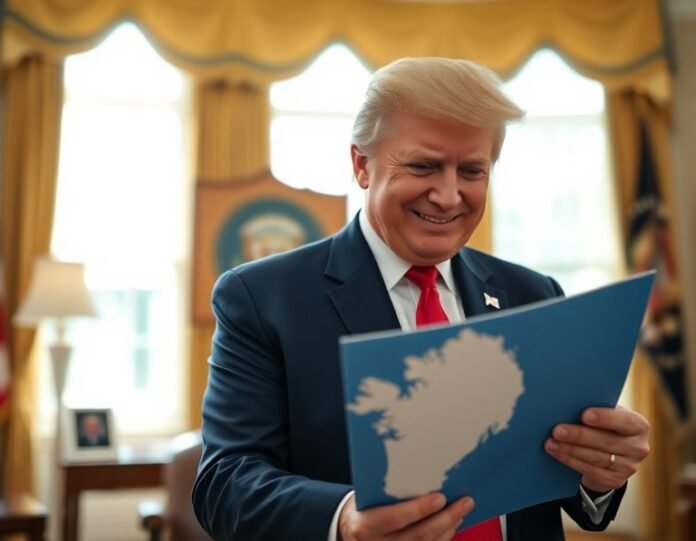U.S. lawmakers have given their green light to former President Donald Trump’s long-discussed bid to purchase Greenland from Denmark. What was once seen as a whimsical, even comedic, proposal during Trump’s tenure in office has now gained official backing from members of Congress. This shift marks a significant moment in U.S. foreign policy, with many questioning the potential implications of such a move on global diplomacy and relations between the U.S., Denmark, and Greenland.
The idea of the United States purchasing Greenland first emerged in 2019, when President Trump casually suggested that the U.S. should acquire the vast Arctic territory. His comments, made during a visit to Denmark, were initially met with laughter and disbelief. Many saw the proposal as a mere distraction or a strange political joke. Denmark rejected the idea outright, calling it “absurd,” and the matter seemed to fade into the background.
However, recent developments have brought the idea back into the spotlight. After a period of growing interest in the strategic value of Greenland due to its location in the Arctic and its potential for natural resources, a number of influential lawmakers have taken up Trump’s proposal, pushing for a formal move toward the acquisition of the territory. The renewed interest is driven by both strategic and economic factors, with Greenland’s vast untapped resources—ranging from minerals to oil and gas—seen as a significant asset in an increasingly competitive global landscape.
Supporters of the proposal argue that Greenland’s geographic position in the Arctic gives the U.S. an unprecedented opportunity to expand its influence in the region, especially as climate change opens up new shipping routes and access to vital resources. The growing importance of the Arctic, coupled with rising tensions between the U.S. and countries like Russia and China, has made the idea of securing a stronger foothold in the region appealing to many lawmakers. They believe that acquiring Greenland would solidify the U.S.’s position as a dominant power in the Arctic and counter the growing influence of Russia, which has been expanding its military presence in the area.
Moreover, the proposal is seen by some as a way to protect Greenland’s unique cultural and environmental heritage while ensuring its future development. Advocates argue that the U.S. has the resources and infrastructure to invest in Greenland’s economic growth, particularly in sectors such as mining, tourism, and renewable energy. They envision a future where Greenland benefits from American investment while still maintaining its autonomy as an entity within the Kingdom of Denmark.
However, the proposal has sparked significant controversy, both within the U.S. and internationally. Critics argue that the push to acquire Greenland is a misguided and imperialistic move that disregards the wishes of the people of Greenland, who have long valued their self-governance. Greenland is a self-governing territory of Denmark, and its population has consistently expressed little desire to be absorbed into another country. The push for acquisition raises serious concerns about undermining Greenland’s sovereignty and the potential cultural and political ramifications of such a move.
The Danish government has also been quick to reiterate its strong opposition to the proposal. Denmark has consistently maintained that Greenland is an integral part of the Kingdom and that any discussions about the territory’s future would need to involve Greenland’s people, rather than being decided unilaterally by the U.S. or Denmark. The relationship between Denmark and Greenland has evolved over the years, with the latter gaining significant autonomy, including control over its own affairs in areas such as education, health, and fisheries. Denmark has emphasized that any transfer of sovereignty would be a complicated and contentious process that could strain diplomatic ties.
While the U.S. Congress’s approval of the proposal represents a significant step forward, it is far from certain that Greenland will be open to negotiations. Greenland’s leaders, including its Prime Minister, have already expressed their strong opposition to the idea. Greenland is proud of its independence, and many in the territory see the proposal as a form of political intrusion that disregards their desires for self-determination.
The issue also brings to light the broader questions surrounding U.S. foreign policy in the Arctic. The region, once seen as a frozen wasteland, is now a geopolitical hotspot as global warming opens up new trade routes and resource extraction possibilities. The U.S. is not the only nation vying for influence in the Arctic; Russia, China, and Canada are also pursuing their interests in the region, which makes the situation even more complex.
As the debate over Greenland’s future continues to evolve, it is clear that the proposal to acquire the territory is no longer just a joke or a political stunt. With backing from U.S. lawmakers and growing interest in the strategic importance of the Arctic, the idea is now a serious issue in international relations. Whether or not it ultimately leads to a successful acquisition of Greenland remains to be seen, but the path forward will undoubtedly shape the future of U.S.-Greenland relations and U.S. influence in the Arctic for years to come.

